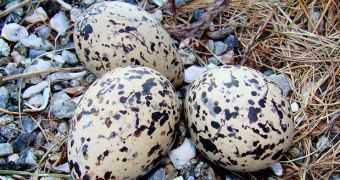According to a new scientific study, it may be that birds tend to favor some of their offspring over others, but with very good reason. That is to say, the animals simply want to reduce their losses in case something bad happens to the future generation. When a young bird becomes infected with parasites, for instance, its parents prefer diverting most food and attention away from it, therefore favoring those offspring that are healthy and could potentially live for longer and mate more. Everything is done with the best interest of the species' survival in mind, experts say.
The study also reveals that this selection and favoring behavior may begin even before the small ones hatch from their eggs. The new conclusion was reached after investigators looked at how the Sturnus unicolor species (spotless starlings) took care of its infants. The species was selected because its eggs were very often infected by the bloodsucking Carnus hemapterus flies. The parasites tend to leave brown spots on the unhatched eggs, and the experts reveal that the more spots one egg has, the greater the risk that the newborn offspring will be infected.
Scientists from a Spanish National Research Council (SNRC) research station, in Almeria, decided to verify if the parent starlings tended to change their behavior toward their youngsters by simply gauging the colors on the eggs. The team managed to create a colony living in next boxes, and observed how the parents tended to treat their eggs. In order to get the most conclusive results, they cleaned up some of the eggs, removing the brown spots, but marking them otherwise so as to know which of them was at a higher chance of getting infected.
When the eggs hatched, the researchers were surprised to learn that the offspring that came from naturally spotty eggs tended to get a lot less attention than young starlings that hatched from the cleaned eggs. In addition, it was observed that fathers tended to pay more parental visits rather than mothers. The experts say that there is a sound evolutionary reason for this. Starling fathers can sire a large number of eggs at the same time, and therefore they need to be able to discern which of their offspring has the highest chance of survival.
The SNRC team was led by expert Jesus Miguel Aviles. The group published a full account of this study in the latest issue of the respected scientific journal Animal Behavior, LiveScience reports.

 14 DAY TRIAL //
14 DAY TRIAL //